November 11
Kurt Vonnegut Jr.
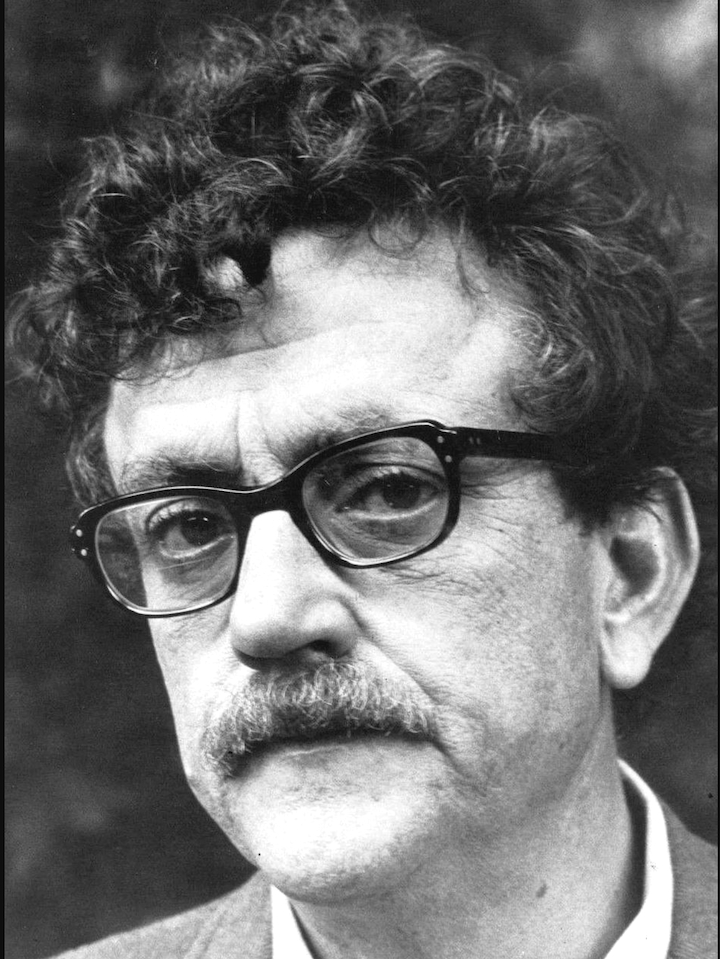
On this date in 1922, author Kurt Vonnegut Jr. was born in Indianapolis, Indiana. Clemens Vonnegut Sr., his German immigrant great-grandfather, helped found the Freethinker Society of Indianapolis in the 1870s. He enrolled at Cornell University and wrote for the student newspaper before leaving after three years when he was drafted into the U.S. Army in 1943.
His books and short stories, including social satire, black comedy and science fiction, often take a tragicomic turn. Life-altering experiences included his mother’s suicide on Mother’s Day 1944 while he was home on leave and surviving as a prisoner of war the Allied incendiary bombing that destroyed Dresden, Germany.
His first novel, Player Piano, was published in 1954, followed by The Sirens of Titan (1959), Mother Night (1961), Cat’s Cradle (1963), God Bless You, Mr. Rosewater; or, Pearls Before Swine (1965), Slaughterhouse-Five (1969), Breakfast of Champions (1973), Slapstick (1976), Jailbird (1979), Galápagos (1985) Bluebeard (1987) Hocus Pocus (1990) and Timequake (1997). Several collections of his short stories and essays have also been published, such as God Bless You, Dr. Kevorkian (1999).
While admitting that churches did some good, he was mostly dismissive of religion. In Issue 82 of the literary journal Image, he’s quoted as saying, “I am not, nor have I ever been a Christian, so I should not be given a funeral or memorial service under any sort of Christian supervision or in any Christian space.” In a 1991 letter to Billie Lyon he wrote, “When I, an atheist (there’s money in it), hear from a man about to get out of prison who has no family waiting for him, who wants to know what to do with freedom, I tell him, ‘Join a church.’ The risk in that, of course, is that he might join the wrong one, and wind up back in the cooler for blowing up an abortion clinic.” (“Kurt Vonnegut: Letters,” ed. Dan Wakefield, 2012.)
He was married to Jane Marie Cox from 1945 to 1971. He married photographer and children’s author Jill Krementz in 1979. He had three biological children and adopted four others. Vonnegut was named 1992 Humanist of the Year of the American Humanist Association and later became its honorary president. He died at age 84 from brain injuries suffered several weeks earlier in a fall at his home in New York. D. 2007.
Public domain photo: Pvt. Kurt Vonnegut between 1943-45.
“I am an atheist (or at best a Unitarian who winds up in churches quite a lot).”
—Vonnegut, "Fates Worse Than Death: An Autobiographical Collage of the 1980s" (1991)
Joseph McCabe
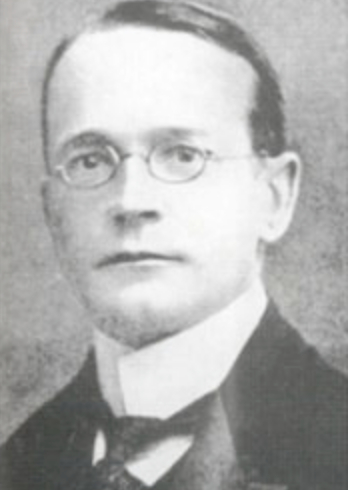
On this date in 1867, former priest and freethought scholar Joseph McCabe was born in Macclesfield, England, to a Catholic father and Protestant mother who converted to Catholicism. As the second son in the large and poor family, he was sent at age 16 to a preparatory college at the Gorton Franciscan monastery. He was ordained a priest at age 23. As a teacher of philosophy at a Catholic school, McCabe began to doubt religion. In 1895 his moment of “no faith” came on Christmas Eve after weighing a list of pro and con arguments for belief in God (see quote).
McCabe wrote Twelve Years in a Monastery (1897), which sold 100,000 copies. Among his 200 published books were many biographies. He also translated about 50 works, including Ernest Haeckel’s Riddle of the Universe (1902), and popularized science and history. His critiques of religion include The Rise and the Fall of the Gods (1930). Toward the end of his life, he wrote primarily about the unholy alliance between fascism and other governments with religion in such books as The Papacy in Politics Today (1937) and A History of the Second World War (1946).
Although his acquaintances were a “who’s who” of freethinkers and reformers, McCabe’s testy personality got him expelled from the British Rationalist Association. He maintained a long-term relationship with American paperback magnate E. Haldeman-Julius, who published 121 “Little Blue Books” by McCabe and 122 larger books, earning McCabe $100,000 in royalties. McCabe requested that his epitaph read “He was a rebel to his last breath.” D. 1955.
Photo: McCabe in 1910.
“I took a sheet of paper, divided it into debt and credit columns on the arguments for and against God and immortality. On Christmas Eve I wrote ‘bankrupt’ at the foot. And it was on Christmas morning 1895, after I had celebrated three Masses, while the bells of the parish church were ringing out the Christmas message of peace, that, with great pain, I found myself far out from the familiar land — homeless, aimlessly drifting. But the bells were right after all; from that hour on I have been wholly free from the nightmare of doubt that had lain on me for ten years.”
—Joseph McCabe, "Twelve Years in a Monastery" (1897)
Pete Stark
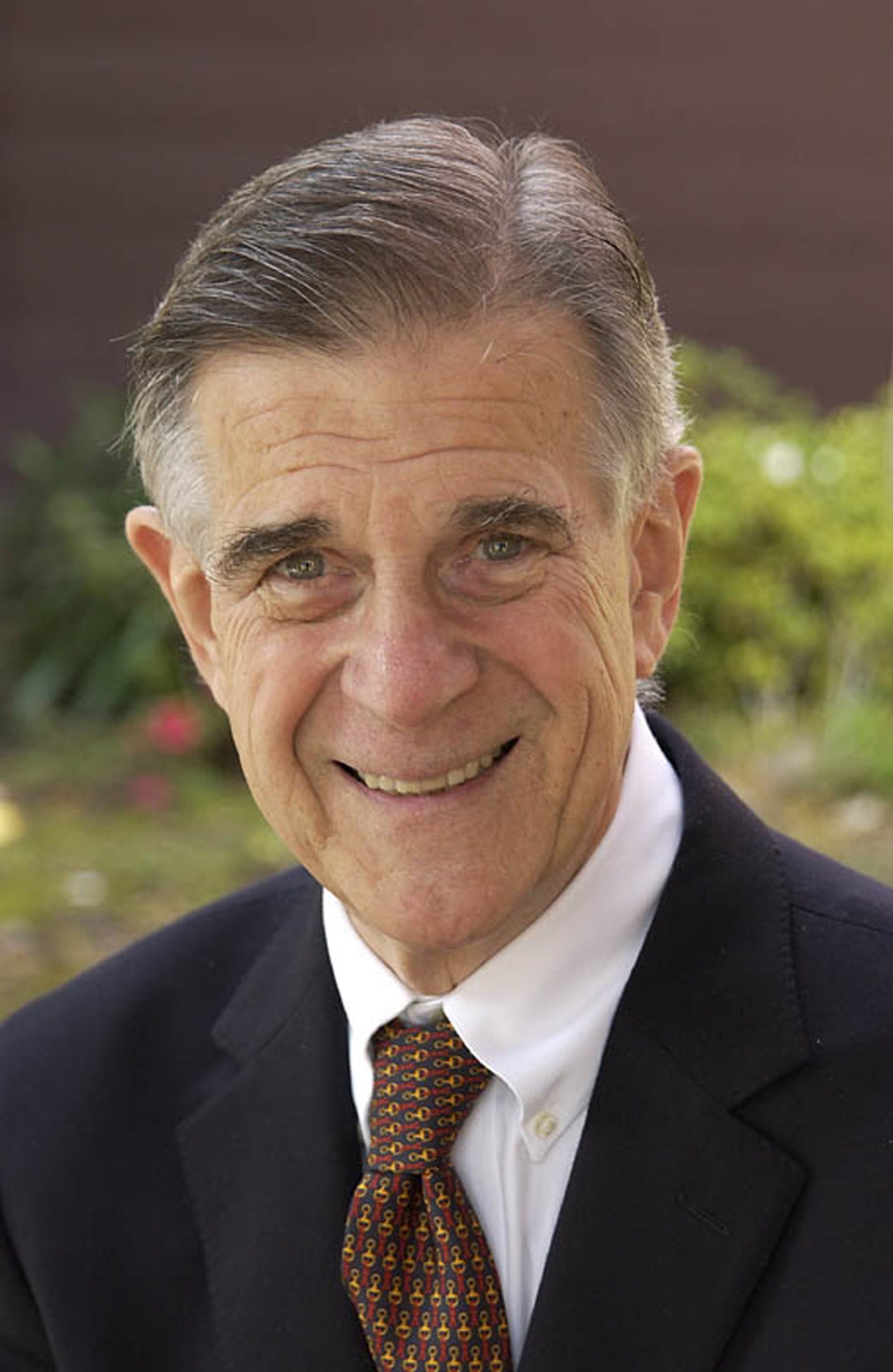
On this date in 1931, Fortney Hillman “Pete” Stark Jr. was born in Milwaukee, Wis. He graduated from the Massachusetts Institute of Technology with a degree in engineering (1953), and served in the U.S. Air Force from 1955-57. In 1960 he earned a master’s in business administration from the University of California-Berkeley. In 1963 he founded Security National Bank (Walnut Creek, Calif.), which grew into a $1 billion financial institution.
Stark served in Congress from 1973 to 2013 representing the 13th Congressional District, a diverse area covering the east side of the San Francisco Bay, stretching from Alameda to Fremont. Stark received less than 60% of the vote only twice since his first election. He served on the House Banking and Currency Committee in his first term in Congress and as a senior member of the Ways and Means Committee.
Stark for years was the only open nonbeliever in Congress. In 2007, members of Congress received a survey about their religious belief and Stark answered “that I didn’t believe in a supreme being. Within a week, I had 5,000 responses from around the world, almost all of them favorable.” (Stark, accepting FFRF’s 2010 Emperor Has No Clothes Award via a videotaped message.)
Stark issued a statement about his nonbelief on March 12, 2007: “Like our nation’s founders, I strongly support the separation of church and state. I look forward to working with the Secular Coalition to stop the promotion of narrow religious beliefs in science, marriage contracts, the military and the provision of social services.” He received the 2007 Harvard Humanist of the Year award. In 2008 he was honored as Humanist of the Year by the American Humanist Association. In 2011 he introduced a House bill “Expressing support for designation of Feb. 12, 2011, as Darwin Day and recognizing the importance of science in the betterment of humanity.”
He and Deborah Roderick Stark have seven children. D. 2020.
Public domain photo: Stark in 2002.
“Thankfully, we’re moving in a direction where some feel it’s not an act of courage simply to state that you don’t believe in God. … We must continue to speak out, be honest about our beliefs.”
—Stark, acceptance speech for the 2010 Emperor Has No Clothes Award
Hugh Everett III
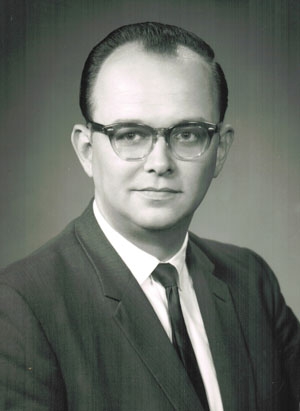
On this date in 1930, Hugh Everett III was born in Washington, D.C. He graduated in 1953 from the Catholic University of America in Washington with a degree in chemical engineering. Everett then attended Princeton University and earned his Ph.D. in physics in 1956. He was a co-founder of the Institute for Defense Analyses in 1956. Everett founded Lambda Corp., a defense analysis organization that assisted the Pentagon, in 1964. He married Nancy Gore in 1956 and they had two children, Elizabeth Everett and Mark Oliver Everett (lead singer of the band Eels).
Everett was a physicist interested in theoretical and quantum physics who is known for developing the influential theory, “The Many-Worlds Interpretation of Quantum Mechanics.” His theory, part of his Ph.D. thesis, postulated that our universe is part of a multiverse, a vast system of universes. He hypothesized that every universe is constantly splitting into alternate universes that encompass every possible event. Everett’s theory, along with his book, The Many-Worlds Interpretation of Quantum Mechanics (1973), is widely studied by quantum physicists.
Everett was a “lifelong atheist,” according to The Many Worlds of Hugh Everett III (2010) by Peter Byrne. During his time at the Catholic university, Everett “drove devout Jesuits to distraction with scientific questioning” and even caused one of his professors to lose his faith after presenting a logical proof against the existence of God (quoted in The Many Worlds of Hugh Everett III).
He died in 1982 at age 51 of a heart attack and had been in poor health from smoking, drinking and obesity. In Mark Oliver Everett’s memoir, Things the Grandchildren Should Know (2008), he wrote, “My dad, who was a devout atheist, had once told my mom that he wanted his remains to be thrown out in the trash.” His wife kept his ashes in an urn for a few years before allegedly complying with his wishes. D. 1982.
Photo: Everett at age 34.
“Because of his loudly avowed atheism, he was labeled ‘the heretic’ by devout classmates.”
—Peter Byrne, writing about Everett in "The Many Worlds of Hugh Everett III" (2010)
Veterans Day
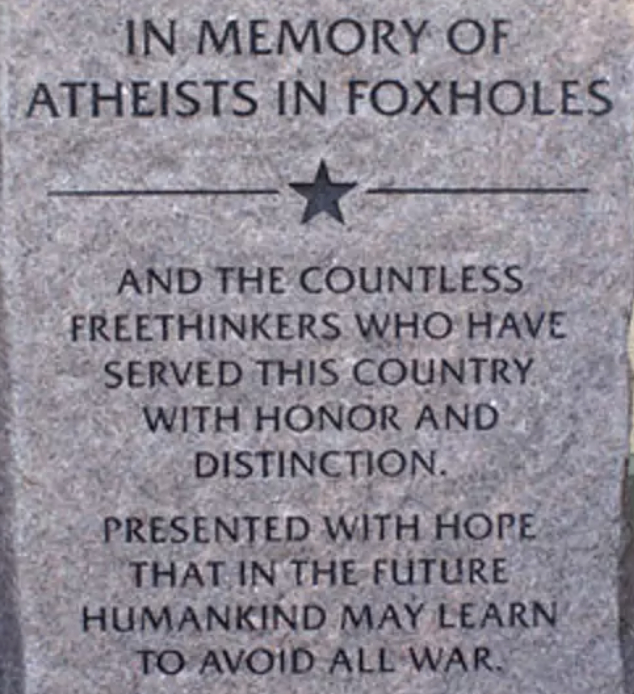
Originally known as Armistice Day, November 11 marks the anniversary of the ceasefire of World War I in 1918 on the eleventh hour of the eleventh day of the eleventh month. In 1919 President Woodrow Wilson proclaimed November 11 as the first commemoration of Armistice Day and Congress made it a legal holiday in 1938. In 1954 Congress renamed the holiday Veterans Day.
Contrary to the myth that there have been “no atheists in foxholes,” nonreligious Americans have and are serving their country with valor and distinction. To recognize their contributions, and “with hope that in the future humankind may learn to avoid all war,” FFRF in 1999 erected the first monument to Atheists in Foxholes, which rests beside its southern Freethought Hall near Talladega, Alabama. In 2015 FFRFplaced a second Atheists in Foxholes monument at Freethought Hall in Madison, Wisconsin.
—
Andy Partridge
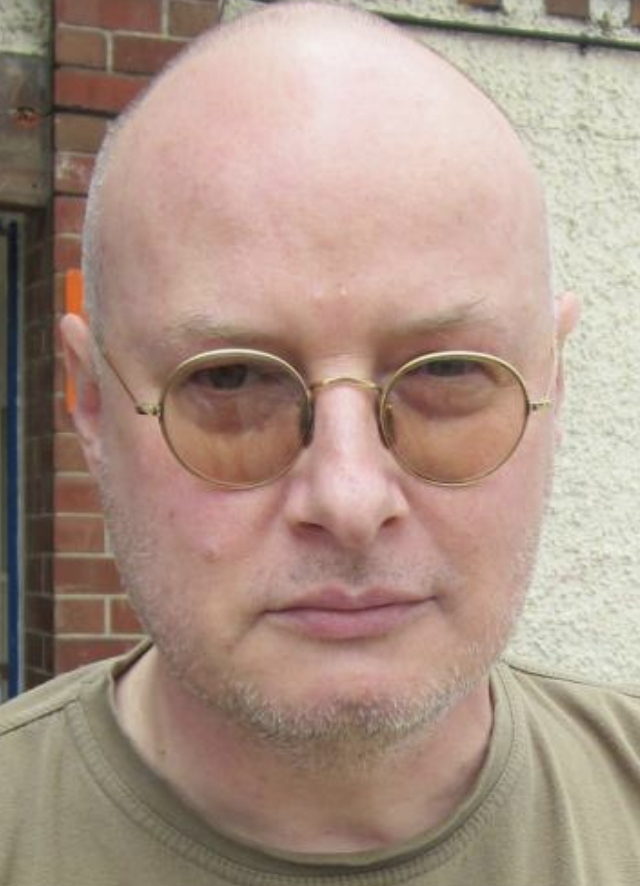
On this date in 1953, English musician Andrew John Partridge was born in Mtarfa, Malta, the only child of a Royal Navy signalman and a retail assistant in a pharmacy. Growing up in Swindon, England, he taught himself to play the guitar. The first records he ever bought were “Sgt. Pepper’s Lonely Hearts Club Band” (1967) and “The Monkees” (1966).
He dropped out of school to play in several rock bands (and to meet girls). In 1972 he and Colin Moulding started XTC, a formative punk group for which Partridge wrote most of the songs and sang most of the lead vocals. His music drew heavily from ’60s British Invasion songwriters, and his style gradually shifted to more traditional pop. He wrote XTC’s only UK top 10 hit, “Senses Working Overtime,” in 1982.
That year the band stopped touring but kept recording. Partridge also formed the Dukes of Stratosphear, whose albums outsold XTC’s. He started producing albums for other artists. In the 1990s he came to be regarded as “godfather” to the Britpop movement that expressed artists’ “Britishness.” XTC went on hiatus in 2006, and Partridge announced in 2008 his “musical partnership with Colin Moulding has come to an end.” He continued to work with other groups and on solo projects, including a 2021 four-song EP he called the first in “My Failed Songwriting Career” series.
Partridge was married to Marianne Wyborn from 1979 to 1994 and they had two children, Holly and Harry. After divorcing, he had a long-term relationship with American singer Erica Wexler. They started dating shortly after she split from artist Roy Lichtenstein.
In 2016 he called himself “very left” politically and said he had voted for Margaret Thatcher “purely because she was a woman. I was that naive.” He identifies with atheism and paganism, he has said. On the record sleeve of “Apple Venus Volume 1” (1999), XTC’s 13th studio album, is the Wiccan directive “Do what you will but harm none.”
“So Andy Partridge, nonbeliever, believes in heaven,” an interviewer once asked him? “Yes. Here, now. This is heaven and hell,” he replied. “I’m sure that’s what heaven is, really. Heaven is not hurting anyone.” (“The Dukes of Swindon,” Chalkhills.org, May 1989)
“I’m interested in the pre-Christian appreciation of the land and the spirit of things, spirits in animate things and inanimate things. I think it’s more of a natural wanting to believe in something natural and something tangible rather than Christianity, which I think is totally fake. Maybe well-meaning, but it’s held together by a terrible web of fibs and stealing other people’s good stories.”
—Interview, Chalkhills: The XTC Resource (March 5, 1999)
